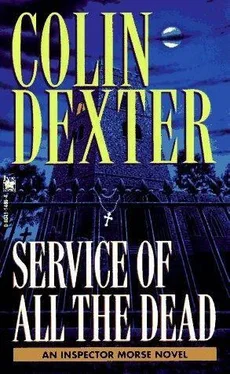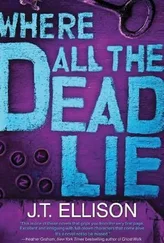Colin Dexter - Service of all the dead
Здесь есть возможность читать онлайн «Colin Dexter - Service of all the dead» весь текст электронной книги совершенно бесплатно (целиком полную версию без сокращений). В некоторых случаях можно слушать аудио, скачать через торрент в формате fb2 и присутствует краткое содержание. Жанр: Триллер, на английском языке. Описание произведения, (предисловие) а так же отзывы посетителей доступны на портале библиотеки ЛибКат.
- Название:Service of all the dead
- Автор:
- Жанр:
- Год:неизвестен
- ISBN:нет данных
- Рейтинг книги:3 / 5. Голосов: 1
-
Избранное:Добавить в избранное
- Отзывы:
-
Ваша оценка:
- 60
- 1
- 2
- 3
- 4
- 5
Service of all the dead: краткое содержание, описание и аннотация
Предлагаем к чтению аннотацию, описание, краткое содержание или предисловие (зависит от того, что написал сам автор книги «Service of all the dead»). Если вы не нашли необходимую информацию о книге — напишите в комментариях, мы постараемся отыскать её.
Service of all the dead — читать онлайн бесплатно полную книгу (весь текст) целиком
Ниже представлен текст книги, разбитый по страницам. Система сохранения места последней прочитанной страницы, позволяет с удобством читать онлайн бесплатно книгу «Service of all the dead», без необходимости каждый раз заново искать на чём Вы остановились. Поставьте закладку, и сможете в любой момент перейти на страницу, на которой закончили чтение.
Интервал:
Закладка:
The constable in the police mortuary re-opened the cabinet and shook out the contents of the plastic bags once more. They were always a funny lot – these fellows from other forces.
Morse managed to keep his hand from shaking as he picked up the earlier of the two diaries and turned to the one specific page. And as he looked at the page the blood seemed to congeal in his jowls, and a slow smile of joyous satisfaction formed about his mouth.
'Thank you very much, constable. Thank you very much. You don't think I could take this diary?'
'I don't know about that, sir. The Super's gone off now and- '
Morse held up his right hand like a priest delivering the benediction. 'Forget it! Doesn't matter!' He turned quickly to Lewis. 'See that?' He pointed to the space for Monday, 26 September, the day on which Harry Josephs had been murdered; and Lewis' forehead creased into a frown as he looked at it, and then looked at it again. The space was completely blank.
'You remember your Sherlock Holmes, Lewis?' But whether or not Lewis was familiar with the works of that great man was not immediately apparent, for clearly Morse himself had a good many passages of Holmesian dialogue by heart, and before Lewis could reply he proceeded to recite one:
'"Is there any point to which you would wish to draw my attention."
' "To the curious incident of the dog in the night-time."
' "The dog did nothing in the night-time."
' "That was the curious incident." '
'I see,' said Lewis, seeing not.
'How fast will she go?' asked Morse as he clambered into the police car once more.
'About ninety – bit more – on the straight.'
'Well, put the flasher on and start the siren up. We must get back to Oxford quickly, all right?'
The car sped through the darkened countryside, down through Bridgnorth and Kidderminster, along the old Worcester Road to Evesham, and then in an almost incredibly short time back to Oxford. An hour and a half – almost to the minute.
'Back to the station, is it?' asked Lewis as he turned into the Northern Ring Road.
'No. Take me straight home, Lewis. I'm tired out.'
'But I thought you said- '
'Not tonight, Lewis. I'm dead beat.' He winked at Lewis and slammed the door of the Ford behind him. 'Good fun, wasn't it? Sleep tight! We've got work to do in the morning.'
Lewis himself drove off home happily. His honest soul had very few vices – but fast driving was certainly one of them.
Chapter Thirty-one
Perhaps the events of the past few days had disturbed the Reverend Keith Meiklejohn rather less than they should have done; and being an honest man the realisation of this was worrying to him. It was true that, inducted as he had been only in the previous November, he had not known the Morris family personally, and could not therefore be expected to react too keenly to the tragic discoveries of what (if rumour were to be believed) were the bodies of father and son. Yet as he sat in his study at 9.30 a.m. on Tuesday morning he knew that his compassion should have been engaged more deeply, and he wondered about himself; wondered about his church, too.
Meiklejohn was a robust, well-built man, forty-one years of age and happily unmarried. His childhood had been spent in a family household brimming with evangelical piety, and one forever frequented by inveterate god-botherers and born-again Baptists. From his earliest years the promises of eternal life and the terrors of the lake that burneth with fire and brimstone had been as real to him as liquorice allsorts and the landscape of his Dorset home. In his early youth, whilst his classmates discussed the prospects of their favourite football teams or the merits of their new racing bikes, young Keith had grown zealous over matters ecclesiastical and theological, and by the age of sixteen the way ahead was quite clear: he was destined to take holy orders. As a young curate he had at first been moderately low-church in his views on the liturgy and the sacraments; but gradually he had been more and more attracted towards the doctrines of the Oxford Movement, and at one point he had come within a communion wafer of conversion to the Roman Church. But all that was in the past. With a new-found balance, he discovered he could tread the tight-rope of High Anglicanism with security and confidence, and it was pleasing to him that his congregation appeared to think well of him for doing so. His predecessor, Lionel Lawson, had not (it seemed) found universal favour with an ecclesiastical stance that was decidedly more middle-and-leg than middle-and-off. In fact, when Lawson's curate, some five years earlier, had been promoted to a parish of his own there had been no request to the Bishop for a replacement, and Lawson himself had coped single-handed with the manifold duties of St Frideswide's parish. Inevitably, of course, there had been cuts in services, and it was Meiklejohn's resolve to restore as soon as possible the daily masses at 11.15 a.m. and 6.15 p.m. which were a wholly necessary feature (as he saw things) of a church that was dedicated to the glory of God.
Yet, as he sat at the ancient roll-top desk, the page over which his pen had been poised for several minutes remained blank. It was high time he preached again on transubstantiation: a tricky issue, of course, but one that was vital for the spiritual health of the brethren. But could that sermon wait, perhaps? His limp-leather copy of the Holy Writ lay open before him at the book of Hosea. A marvellous and memorable piece of writing! It was almost as if the Almighty himself had not really known what to do with his people when their goodness and mercy were as evanescent as the mists or the early dews that melted away in the morning sun. Was the Church in danger of losing its love? For without love the worship of God and the care of the brethren was little more than sounding brass and tinkling cymbals… Yes, a possible sermon was just beginning to shape itself nicely. Not too forcefully expressed: nothing to smack too strongly of the stumping pulpit-thumper. But then another verse caught his eye from an earlier chapter of the same prophecy: 'Ephraim is joined to idols; let him alone.' Another striking verse! Idolaters were, after all, those within the Church – not those outside it. Those who worshipped, but who worshipped a false representation of God. And not just the golden calf, either. There was always a danger that other representations could get in the way of true worship: yes – he had to admit it! – things like incense and candles and holy water and crossings and genuflections, and all the sheer apparatus of ceremonial which could perhaps clog up the cleansing power of the Holy Spirit. It was possible, too – only too easy, in fact – to be blinded to the spiritual health of the Church by the arithmetical aggregation of its membership, especially when he considered (as he did with pride) the undoubted increase in the numbers attending divine worship since his own arrival. The records showed that there had been times under Lawson's régime when attendance had been just a little disappointing; and indeed some occasions in midweek when it had been difficult to muster much of a congregation at all! But God didn't just count heads – or so Meiklejohn told himself; and he pondered again the central problem that had dominated his earlier thinking: should he not be more concerned than he was about the spiritual health of his church?
He was still undecided about the text of his next sermon, the page still blank beneath his pen, the disturbing words of the prophet Hosea still lying before him, when the door-bell rang.
Had it been the will of Providence that he had been pondering the state of St Frideswide's soul? At the very least, it was an uncanny coincidence that his visitor was soon asking him the very same questions he had been asking himself; asking them pretty bluntly, too.
Читать дальшеИнтервал:
Закладка:
Похожие книги на «Service of all the dead»
Представляем Вашему вниманию похожие книги на «Service of all the dead» списком для выбора. Мы отобрали схожую по названию и смыслу литературу в надежде предоставить читателям больше вариантов отыскать новые, интересные, ещё непрочитанные произведения.
Обсуждение, отзывы о книге «Service of all the dead» и просто собственные мнения читателей. Оставьте ваши комментарии, напишите, что Вы думаете о произведении, его смысле или главных героях. Укажите что конкретно понравилось, а что нет, и почему Вы так считаете.












